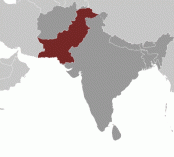
The raid that killed Osama bin Laden in May 2011 was blamed for a spike in polio in Pakistan because some used the CIA’s involvement in the mission – it set up a fake immunisation campaign in order to obtain DNA samples – as an excuse to target vaccinators under the pretence that they were associated with the US.
Yet now the World Health Organisation believes the world is on the verge of becoming free of the disease.
Polio was once one of the most feared diseases but after a global immunisation programme, delivered in the UK through sugar cubes, it was eradicated in most countries in the 1990s.
Pakistan and Afghanistan are the only two countries where polio is still endemic, but in the past year there has been a dramatic drop in cases to 66 in the two countries, compared with 332 cases in nine countries in 2014.
“When we look back on 2015, it may well be seen as the year the tide irreversibly turned on polio,” says the WHO.
There have, however, been several false dawns since polio eradication was set as a target in 1988, when the disease was endemic in more than 125 countries.
In August, Africa marked a year free of the disease. But in September, two children in Ukraine were paralysed after contracting polio in the first cases of the disease in Europe since 2010.
Until two years ago, Pakistan and Afghanistan remained problematic, with the virus resurgent in conflict zones. There remains a risk of regional flare-ups.
The fact that a health programme could be used for gathering intelligence provided “an excuse for people who wanted to promote suspicion”, said Dr Hamid Jafari, director of the global polio eradication initiative at the WHO.
“In 2013, in almost every campaign there was an attack, sometimes successful,” he said. “The CIA certainly gave the excuse to these militants who were using this Osama bin Laden death to attack.”
Advertisement
A fundamental change in approach aimed at reducing health workers’ exposure, combined with improved security and community engagement, is now paying off. A new approach – switching vaccination programmes from four days to one – has had an immediate impact.
“In the context of polio, the timing of the vaccination programme, how much you publicise them, the length of time you expose your workers to a threat, is all considered,” said Jafari.
Fewer armed guards walk around with individual teams; sometimes villages might be cordoned off for a few hours to create a safe zone for vaccinators.
One of the biggest factors in the increase in vaccination in high-risk areas is giving the job to local women, who will be trusted by parents of young children.
“The most important learning in the context of Pakistan is the engagement and empowerment of the community themselves, when the programme engages with the power structures within the community. Leaders in the community take a big part of the control of the programme into the hands of the community, which then provides its own security,” added Jafari.
Latest figures for Pakistan show 49 cases for 2015, compared with 282 in 2014.
The government is now redoubling its efforts in critical areas such as North Waziristan where improved security is allowing displaced families to return home. The WHO hopes that Pakistan and Afghanistan will be polio-free by mid-2016, with global eradication targeted for 2019.
This article originally appears on The Guardian’s website: http://www.theguardian.com/global-development/2015/dec/28/polio-pakistan-afghanistan-world-health-organisation

